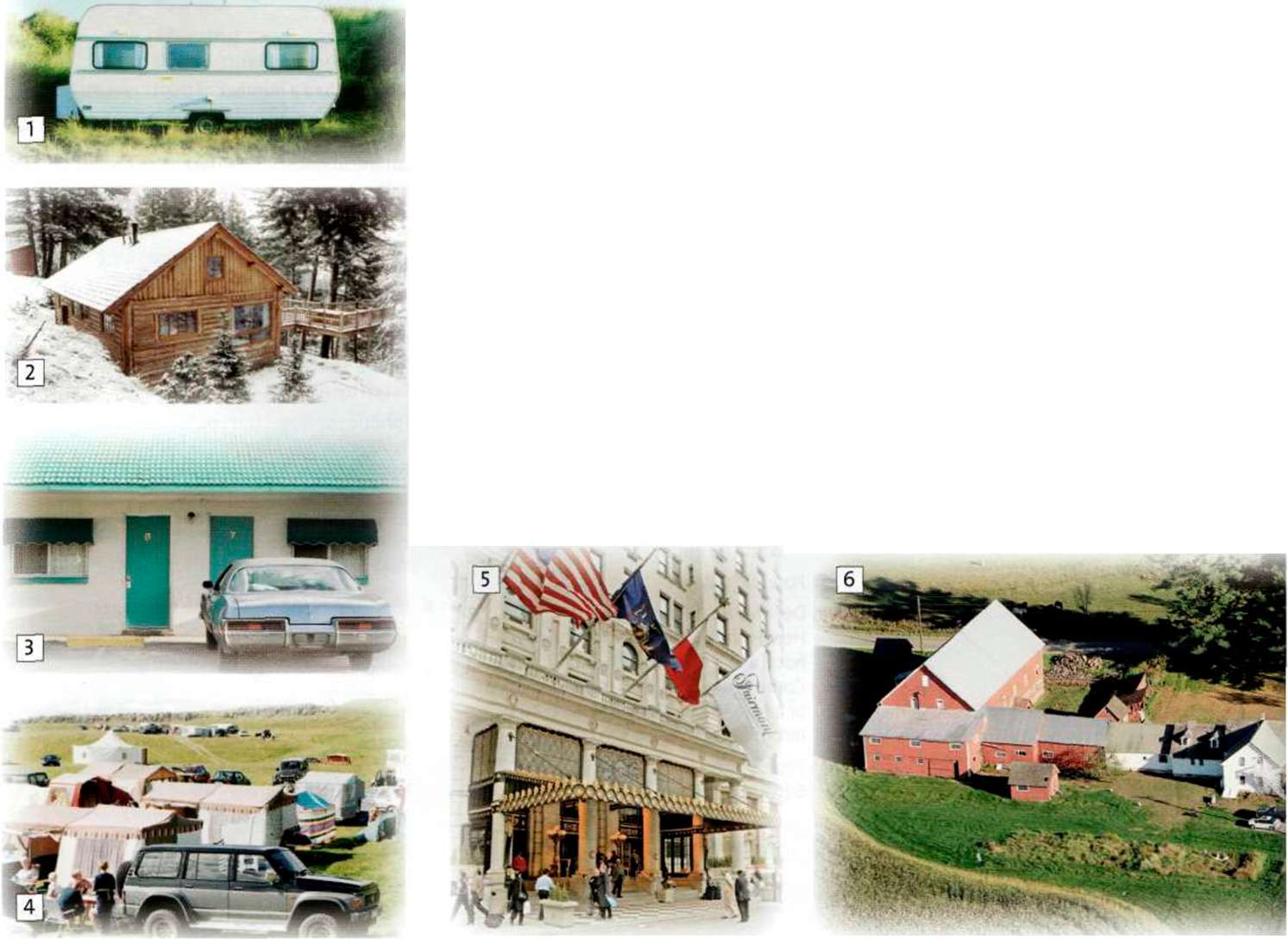
- •Part 1(1). Types of Travelling
- •Vocabulary
- •Vehicles
- •Part 1(2).Types of travelling
- •Checking hometask
- •Minicheck Revision exercises p.1 tb
- •Tourism today Facts and challenges
- •Vocabulary: types of holidays
- •Part 2(1). World destinations
- •Checking hometask
- •Minicheck: Revision exercises p. 3
- •Vocabulary: types of attractions
- •Part 2(2). World destinations
- •Presenting miniprojects, checking grammar
- •Minicheck: Revision exercises p. 4
- •Part 2(3). World destination
- •Checking grammar
- •Minicheck: Revision exercises p. 5
- •Part 3. Describing Places
- •Checking Vocabulary “In a Town”, grammar exercises
- •Minicheck: Revision exercises p.7
- •Giving directions left/right, go straight on, go past, take the first/second turning on the right/left, carry on/keep going until you get, turn into
- •B. Practice the following conversation with a partner using the substitutions in the box:
- •Part 4 (1). Types of accommodation
- •1. Minicheck: Revision exercises p. 9
- •Vocabulary: accomodtion types
- •Part 4 (2). Types of accommodation
- •Checking hometask
- •Minicheck: Revision exercises p. 11
- •What are Youth Hostels?
- •Part 4(3). Types of accommodation
- •Checking h/t
- •Minicheck: Revision exercises p. 12
- •V ocabulary
- •V ocabulary: Services and facilities
- •Materials for pair work
- •Learning vocabulary
- •Grammar exercises:
- •2. Make special questions.
- •3. Translate the following sentences.
- •1. Solve the crossword.
- •1. Project “The place I would like to visit”
- •2. Grammar
- •1. Put the adjectives in brackets into the comparative or superlative form, adding any necessary words, as in the example.
- •2. Fill in the blanks as in the example:
- •3. Put the adjectives in brackets into the comparative or superlative form, adding any necessary words.
- •4. First, fill in the gaps with the correct form of the adjectives in brackets. Then, match the sayings with their explanations, as in the example.
- •1. Underline the correct word.
- •2. Fill in: like or as.
- •Translate the words and phrases
- •2. Match each picture to a shop. Then, for each type of shop, give the name of one in your town.
- •2A Match the words in the two columns. Some words in the second column can be used twice.
- •3. Choose five of the following places in your town to take an English friend. Write sentences explaining your plans, giving details of each place.
- •3B Put the words from the wordsearch in the correct group.
- •4. Where would you go?
- •1. Correct the mistakes, as in the example.
- •2. Fill in: more, most, less, least or much.
- •3. Writing Activity
- •4. Complete the sentences using the words in bold. Use two to five words.
- •1. Label the picture.
- •2. Circle 20 adjectives in the wordsearch.
- •2. “Unusual accommodation”. Report (based on website survey). Describe any type of unusual acoomodation.
- •Independent work
- •Vocabulary tasks
- •1. Choose the correct word to fill in the blanks.
- •2. Fill in the correct word derived from the words in bold.
- •3. Complete the spidergrams with the correct noun. Then use them to describe the place where you spent your holiday last year.
- •5. Which adjective collocates better with the following nouns?
- •Extra Reading and listening activities
- •Paradise lost
- •If it's Tuesday we must be in Munich
Vocabulary: accomodtion types
Task 3. Make a list of different types of tourist accommodation in your country.
Which of these have you stayed in?
Tell your partners about the best / worst / most unusual accommodation you have ever stayed in.
Task 4. a. Match the pictures to the different types of accommodation. Translate the words.
a partment
partment
bed and breakfast
campsite
caravan
chalet
country house
cruise ship
farmhouse
guest house
hostel
hotel
lodge
log cabin
motel
motorhome
mountain refuge
university hall of residence
b. Which of these types of accommodation do you have in your country?
c. Think about each type of accommodation. Is it serviced (meals are provided) or self-catering (you cook your own meals)? Hint: Some types will fit into either category.
d. Now repeat your discussion, but this time categorize the different types of accommodation as
1 urban or rural
2 static or mobile.
e. Go to the Internet or your local tourist information office. Find serviced or self-catering accommodation in your area that would be suitable for
1 a family (two adults, two small children) on holiday, but with a limited budget
2 a business traveller staying in your area for three days for a conference
3 a retired couple who want to see the important monuments in your area
4 a student like you
(taken from Robin Walker and Keith Harding Oxford English for Careers. Tourism 1. Student ‘s book p. 60)
Task 5. Match the word with its definition and compare the meanings.
|
|
|
|
|
|
|
|
|
|
|
|
(taken from Сербиновская А.М. Английский язык для турбизнеса и сервиса. стр. 141)
Task 6. Describing accommodation: adjectives and nouns
a. You can have a metropolitan hotel but you cannot have a metropolitan cottage. Why not?
b. Match adjectives from A with nouns from B. Different variants can be possible
A
five-star
country
converted
budget
friendly
metropolitan
medieval
modern
self-catering
10. stylish
В
apartment
bed and breakfast
cabin
cottage
farmhouse
guesthouse
hostel
hotel
motel
villa
c. Which adjective can describe most nouns? Which adjectives combine with only one of the nouns?
Choose different adjective-noun combinations and use them to write sentences to describe accommodation you have stayed in as a tourist.
(taken from Robin Walker and Keith Harding Oxford English for Careers. Tourism 1. Student ‘s book p. 64)
Home task 7.
